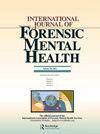The Role Played by Theory of Mind and Empathy in the Feigning of Psychopathology
IF 0.9
4区 医学
Q3 CRIMINOLOGY & PENOLOGY
International Journal of Forensic Mental Health
Pub Date : 2021-12-26
DOI:10.1080/14999013.2021.2007432
引用次数: 6
Abstract
Abstract In this article, we hypothesized that in order to feign mental illness, one would need to have empathy and be able to understand other’s mental states. To test this hypothesis, we asked 432 healthy volunteers to feign depression, PTSD or schizophrenia while completing a self-report test that measures the severity of the feigned condition’s symptoms and the Inventory of Problems − 29 (IOP-29). Additionally, all participants were administered a theory of mind (ToM) task and an empathy measure with the request to respond truthfully. Results from a series of linear regression models revealed that higher cognitive empathy is associated with increased symptom endorsement on self-report symptom questionnaires and higher ToM abilities are associated with less credible feigned profiles, especially in the case of feigned depression.心理理论与共情在精神病理伪装中的作用
摘要在这篇文章中,我们假设为了假装精神疾病,一个人需要有同理心,并且能够理解他人的精神状态。为了验证这一假设,我们让432名健康志愿者假装抑郁症、创伤后应激障碍或精神分裂症,同时完成一项自我报告测试,该测试测量假装症状的严重程度和问题清单-29(IOP-29)。此外,所有参与者都接受了心理理论(ToM)任务和移情测量,要求他们如实回答。一系列线性回归模型的结果显示,较高的认知移情与自我报告症状问卷中症状认可的增加有关,较高的ToM能力与不太可信的假装档案有关,尤其是在假装抑郁的情况下。
本文章由计算机程序翻译,如有差异,请以英文原文为准。
求助全文
约1分钟内获得全文
求助全文

 求助内容:
求助内容: 应助结果提醒方式:
应助结果提醒方式:


